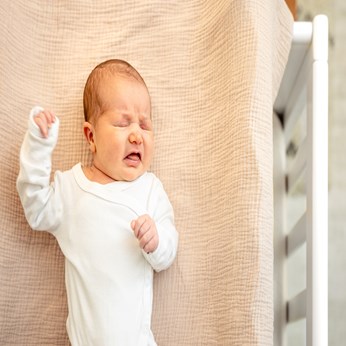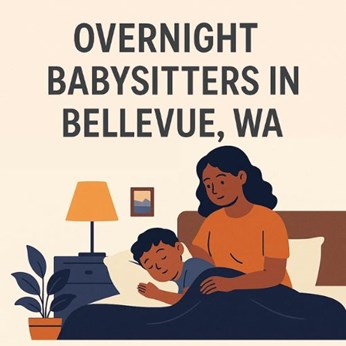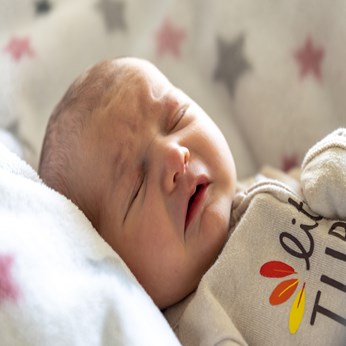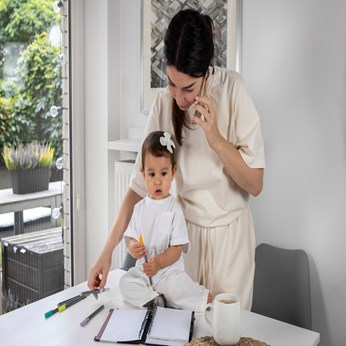Hearing Tests for Newborn Babies
Hearing tests for newborn babies are very important because the ability to hear is the foundation of a baby’s ability to learn. Experts recommend hearing tests to screen hearing loss within 48 hours or at least before leaving the hospital. It is significant to find that in the United States of America every 2 to 3 babies out of 1000 are born with hearing loss, with appropriate diagnosis and intervention helping to overcome delays in speech, language, social and academic skills.
Know about the screening tests:
Hearing screening tests for newborns are of 2 types namely, automated auditory brainstem response (AABR) and otoacoustic emissions (OAE); each takes about 5 to 10 minutes with most babies sleeping through them.
The AABR test involves the nurse placing sensors attached to a computer on the baby’s scalp that measures the brainwave activity to little clicking sounds transmitted through small earphones. The OAE test involves placing a little device that makes soft clicking sounds in the baby’s ear, with a computer attached to the device recording the ear’s response to sounds.
Some hospitals do the AABR and OAE simultaneously, while others first do the OAE test followed by the AABR in case of not testing well.
If my baby doesn’t pass the tests:
If your baby doesn’t pass the screening test it necessarily does not mean that he/she has a hearing problem; it only indicates more testing is to be done preferably within the first month of life.
Sometimes babies may fail at the 1st screening due to fluid in the middle ear, debris in the ear canal, the room being noisy or the baby moving or crying. If the baby has hearing loss, he/she will be referred to an audiologist to conduct further tests to determine how significant it is and what can be done to help him/her.

Is there no hearing loss if the baby passes the hearing test?
The newborn passing the hearing screening tests does not necessarily mean he/she has no hearing impairment as these tests do not detect mild degrees of permanent hearing loss and the baby could have mild degrees of hearing loss or may develop hearing loss in future. There could be delayed onset of hearing loss due to injury, genetics, illness, or exposure to loud and prolonged levels of noise.
Regular checking of the hearing in well-baby checkup is advisable; you could consult an audiologist for further tests in case you are concerned.
Can I tell my baby can’t hear?
You may or may not be able to say that your baby has a hearing problem because there could be various degrees of hearing loss. You cannot presume that your baby has good hearing if he/she turns towards you when you talk or enter the room as your baby may to hear some sounds, but miss something else. This would affect his/her ability to speak, develop socially and intellectually.
As a conclusive note, there is no excuse to not testing your baby’s hearing at birth because undetected deafness as we have seen affects many crucial stages of early development in a baby.
Image Courtesy: Google
Take the next step toward your goals
Share your requirement and find the best care providers in your area
-
Looking for a caretaker’s job? Build your profile and get in touch with families in your vicinity.
-
Discover nannies, babysitters, cooks, housekeepers, pet sitters, and elder care under one roof.
-
Get all the support you need to run a successful care center.
-
Search for appropriate centers near you depending on your needs.
Care Corner Insights: Blog Library

Deep Cleaning Your House: Room-by-Room Checklist for a Thorough Clean
A sparkling clean home isn’t just about looks—it’s about health, comfort, and peace of mind. Whether you’re prepping for a festival, hosting guests, or just tired of the clutter, a deep clean can transform your space. But where do you start? Here’s a

What are Senior Apartments? Experts Explain Independent Living for Older Adults
As we age, our needs and lifestyles evolve—but one thing remains constant: the desire for independence. Senior apartments are designed precisely with this in mind, offering older adults a living arrangement that balances freedom with comfort, safety,

Baby Sleep Problems: What is Sleep Regression and How to Handle It
If you’re a parent, you know that baby sleep is one of the greatest mysteries of life. One day your little one is snoozing like an angel, and the next day they’re suddenly waking up every hour, fussing, or refusing to nap. Before you panic, there’s a

Daycare Admissions in Cary, NC for New NRI Families: Documents, Health Records, and Start Dates
Moving to a new country is exciting but also comes with many responsibilities—especially when it comes to finding the right daycare for your little one. For new NRI (Non-Resident Indian) families settling in Cary, NC, understanding the daycare

Overnight Babysitters in Bellevue, WA for Business-Travelling NRI Parents: Safety & Policies
For many NRI parents living in Bellevue, WA, frequent business trips are a reality. While traveling, one of the biggest concerns is ensuring your children are safe, cared for, and emotionally supported during overnight stays. Overnight babysitters ca

Indian Home-Style Cooks in Queens, NY: Tiffin-Style Weekly Meal Prep from Your Kitchen
Queens, NY, is home to one of the most diverse food cultures in the country, and Indian cuisine holds a special place among families looking for authentic, comforting meals. While restaurant takeout is convenient, nothing compares to the taste and nu

Baby Sleep Problems: What is Sleep Regression and How to Handle It
If you’re a parent, you know that baby sleep is one of the greatest mysteries of life. One day your little one is snoozing like an angel, and the next day they’re suddenly waking up every hour, fussing, or refusing to nap. Before you panic, there’s a

What is Validation Therapy? A New Approach to Dementia Care
Caring for loved ones with dementia is one of the most emotionally challenging journeys a family can face. Traditional methods often focus on correcting memory lapses or redirecting confused thoughts—but that can sometimes lead to frustration, stress

What is a Part-Time Nanny and Do You Need One
Parenting is a beautiful journey, but let’s be honest—it can also be exhausting! Between work deadlines, household chores, and family responsibilities, sometimes there just aren’t enough hours in a day. That’s where part-time nannies step in, offerin

Part-Time Housekeeper Hiring in Alpharetta, GA: Weekly Schedules, Pricing, and Must-Do Tasks
Keeping a home spotless while balancing work, family, and personal commitments can be overwhelming. For families and professionals in Alpharetta, GA, hiring a part-time housekeeper is one of the most practical solutions. Whether you need help once a